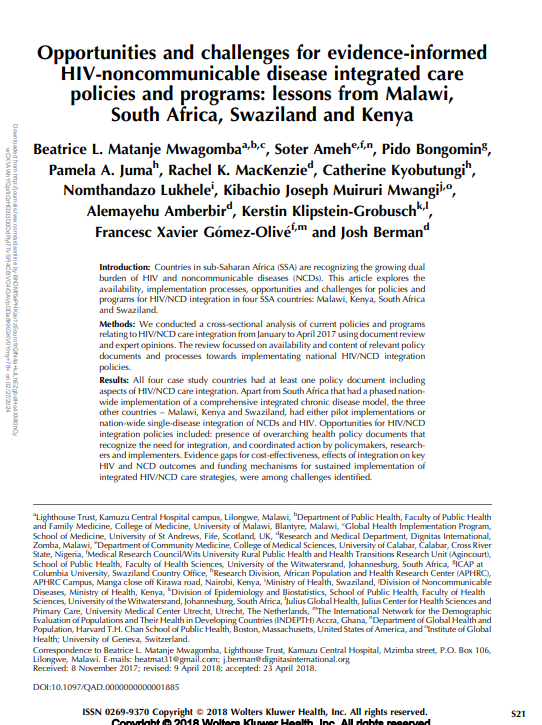Global Allergy & Airways Patient Platform
Atopic Dermatitis Doctor Visit Card
Guide
10 Feb 2026
27 Jul 2018

Countries in sub-Saharan Africa (SSA) are recognizing the growing dual burden of HIV and noncommunicable diseases (NCDs). This article explores the availability, implementation processes, opportunities and challenges for policies and programs for HIV/NCD integration in four SSA countries: Malawi, Kenya, South Africa and Swaziland.
We conducted a cross-sectional analysis of current policies and programs relating to HIV/NCD care integration from January to April 2017 using document review and expert opinions. The review focussed on availability and content of relevant policy documents and processes towards implementating national HIV/NCD integration policies.
All four case study countries had at least one policy document including aspects of HIV/NCD care integration. Apart from South Africa that had a phased nation-wide implementation of a comprehensive integrated chronic disease model, the three other countries – Malawi, Kenya and Swaziland, had either pilot implementations or nation-wide single-disease integration of NCDs and HIV. Opportunities for HIV/NCD integration policies included: presence of overarching health policy documents that recognize the need for integration, and coordinated action by policymakers, researchers and implementers. Evidence gaps for cost-effectiveness, effects of integration on key HIV and NCD outcomes and funding mechanisms for sustained implementation of integrated HIV/NCD care strategies, were among challenges identified.
Policymakers in Malawi, Kenya, South Africa and Swaziland have considered integration of NCD and HIV care but a lack of robust evidence hampers large-scale implementation of HIV/NCD integration. It is crucial for SSA Ministries of Health and throughout low-and-middle-income countries to utilize existing opportunities and advocate for evidence-informed HIV/NCD integration strategies.